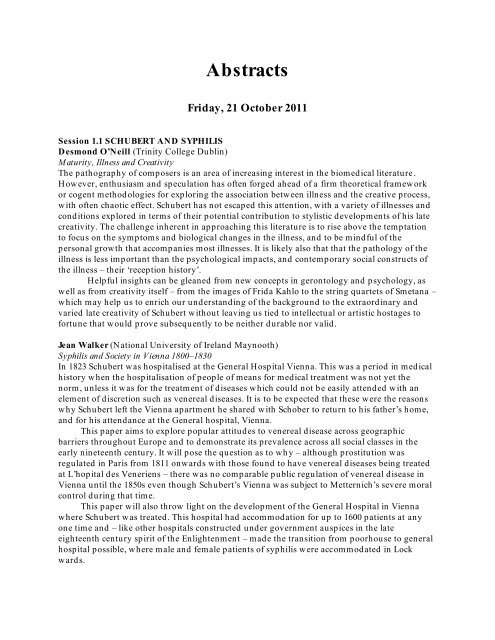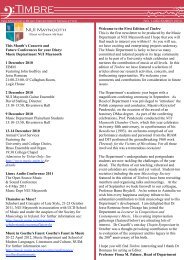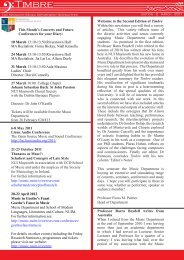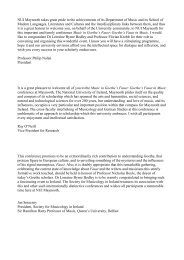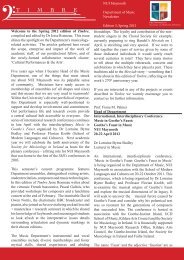Conference Booklet - Music - National University of Ireland, Maynooth
Conference Booklet - Music - National University of Ireland, Maynooth
Conference Booklet - Music - National University of Ireland, Maynooth
You also want an ePaper? Increase the reach of your titles
YUMPU automatically turns print PDFs into web optimized ePapers that Google loves.
Abstracts<br />
Friday, 21 October 2011<br />
Session 1.1 SCHUBERT AND SYPHILIS<br />
Desmond O’Neill (Trinity College Dublin)<br />
Maturity, Illness and Creativity<br />
The pathography <strong>of</strong> composers is an area <strong>of</strong> increasing interest in the biomedical literature.<br />
However, enthusiasm and speculation has <strong>of</strong>ten forged ahead <strong>of</strong> a firm theoretical framework<br />
or cogent methodologies for exploring the association between illness and the creative process,<br />
with <strong>of</strong>ten chaotic effect. Schubert has not escaped this attention, with a variety <strong>of</strong> illnesses and<br />
conditions explored in terms <strong>of</strong> their potential contribution to stylistic developments <strong>of</strong> his late<br />
creativity. The challenge inherent in approaching this literature is to rise above the temptation<br />
to focus on the symptoms and biological changes in the illness, and to be mindful <strong>of</strong> the<br />
personal growth that accompanies most illnesses. It is likely also that that the pathology <strong>of</strong> the<br />
illness is less important than the psychological impacts, and contemporary social constructs <strong>of</strong><br />
the illness – their ‗reception history‘.<br />
Helpful insights can be gleaned from new concepts in gerontology and psychology, as<br />
well as from creativity itself – from the images <strong>of</strong> Frida Kahlo to the string quartets <strong>of</strong> Smetana –<br />
which may help us to enrich our understanding <strong>of</strong> the background to the extraordinary and<br />
varied late creativity <strong>of</strong> Schubert without leaving us tied to intellectual or artistic hostages to<br />
fortune that would prove subsequently to be neither durable nor valid.<br />
Jean Walker (<strong>National</strong> <strong>University</strong> <strong>of</strong> <strong>Ireland</strong> <strong>Maynooth</strong>)<br />
Syphilis and Society in Vienna 1800–1830<br />
In 1823 Schubert was hospitalised at the General Hospital Vienna. This was a period in medical<br />
history when the hospitalisation <strong>of</strong> people <strong>of</strong> means for medical treatment was not yet the<br />
norm, unless it was for the treatment <strong>of</strong> diseases which could not be easily attended with an<br />
element <strong>of</strong> discretion such as venereal diseases. It is to be expected that these were the reasons<br />
why Schubert left the Vienna apartment he shared with Schober to return to his father‘s home,<br />
and for his attendance at the General hospital, Vienna.<br />
This paper aims to explore popular attitudes to venereal disease across geographic<br />
barriers throughout Europe and to demonstrate its prevalence across all social classes in the<br />
early nineteenth century. It will pose the question as to wh y – although prostitution was<br />
regulated in Paris from 1811 onwards with those found to have venereal diseases being treated<br />
at L‘hopital des Veneriens – there was no comparable public regulation <strong>of</strong> venereal disease in<br />
Vienna until the 1850s even though Schubert‘s Vienna was subject to Metternich‘s severe moral<br />
control during that time.<br />
This paper will also throw light on the development <strong>of</strong> the General Hospital in Vienna<br />
where Schubert was treated. This hospital had accommodation for up to 1600 patients at any<br />
one time and – like other hospitals constructed under government auspices in the late<br />
eighteenth century spirit <strong>of</strong> the Enlightenment – made the transition from poorhouse to general<br />
hospital possible, where male and female patients <strong>of</strong> syphilis were accommodated in Lock<br />
wards.


